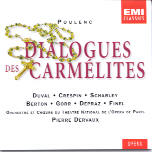Francis Poulenc’s 1957 Dialogues of the Carmelites is a serious, big, theatrically effective work. Though scored predominantly for women, the voice types vary, and the large orchestra is used handsomely enough to keep the ear fascinated. This is a realistic work, set during the French Revolution. Our heroine, Blanche, is a terrified girl who searches for peace within the order of Carmelite nuns she joins; with the background of The Reign of Terror, her fear is palpable. At the opera’s close the nuns are guillotined–it’s a riveting, memorable scene, with the thwap! of the guillotine written into the score at odd enough intervals to remain shocking. This 40-year-old recording has stood up well over the years. The sound is a bit boxy, but the performances are first rate: Denise Duval’s Blanche is a fine portarait, Denise Scharley’s Old Prioress is excellent, particularly in her death scene, Rita Gorr’s Mother Marie is strong, and the young Régine Crespin is a remarkable, very human Madame Lidoine. The rest of the cast is just as fine and Pierre Dervaux keeps these “dialogues” (there are no set pieces or arias) moving with great lyricism and intimacy, readying us for the final scene. If it’s full, modern sonics you want, the terrific Nagano reading on Virgin is for you, but this set is superb.
































